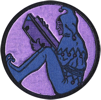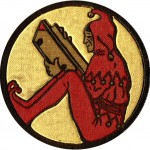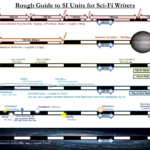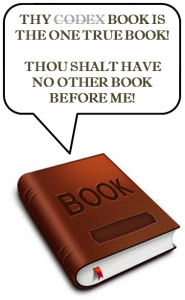
 passpause (n.) The hesitation caused by uncertainty during the typing of a password screened by bullets or asterisks.
passpause (n.) The hesitation caused by uncertainty during the typing of a password screened by bullets or asterisks.

 passpause (n.) The hesitation caused by uncertainty during the typing of a password screened by bullets or asterisks.
passpause (n.) The hesitation caused by uncertainty during the typing of a password screened by bullets or asterisks.

 From an MSNBC article on the asteroid buzzing Earth today (not picking on them, as this is typical of science reporting):
From an MSNBC article on the asteroid buzzing Earth today (not picking on them, as this is typical of science reporting):
Asteroid 2004 BL86, which is about 1,800 feet (550 meters) wide, will come within 745,000 miles (1.2 million kilometers) of our planet Monday — about three times the distance between Earth and the moon. While this flyby poses no threat to Earth, it does present a rare opportunity to get a good look at a near-Earth asteroid, NASA officials say.
Note how they switched from meters to kilometer from one scale to the next? Imagine how dumb it would have sounded if that second number had been “1.2 billion meters.”
Well, it was still dumb, because the SI system has a unit of measure for that scale: 1.2 million kilometers = 1.2 gigameters.
MSNBC had a perfect opportunity with that “three times the distance” clarification to give readers a sense of how big a gig really is. And instead they punted.
As I bluntly put it before:
Long ago, one might have made the argument that people can’t grasp the thousand-fold relationship between SI prefixes, but the enthusiasm with which consumers rode the electronic ramp-up from kilobytes to megabytes to gigabytes to terabytes proves otherwise …
And, anyone who talks about how many “million kilometers” it is to Jupiter or Saturn should be euthanized. “Meter” is the base unit and “kilo” means “thousand.” Are you telling us that Jupiter is eight hundred million thousand meters from the Sun? Forgive me, but that’s unforgivably dumb. If you mean “gigameter” then say it. If you think people need reminded how big “giga” is, try a parenthetical statement or, hell … let them Google it.
Let’s drop the timid writing, because people have proven they don’t need it. They understand that gig is bigger than meg and meg is bigger than kilo, even if the scale of it strains human comprehension. They got it. Let’s move on.
For those who want a visual guide to SI units of distance, check this out: Continue reading

 I’ve had a problem since teenhood, when I first began buying entire albums* of music.
I’ve had a problem since teenhood, when I first began buying entire albums* of music.
My problem persists even as digital formats allow us to purchase individual songs rather than entire albums: almost invariably my favorite song from an album or by a band is not one of those that get released as a single, or those that make it big if they are released.
My favorite Garbage song is not the grump-goth favorite “Only Happy When It Rains;” it’s a tie between “As Heaven is Wide” and “Hammering in my Head.” My favorite Kenny Loggins song? “Heaven Helps,” not “Footloose” or “Danger Zone.” I like Mix-A-Lot’s “My Hooptie” better than “Baby Got Back.” From the new Paramore album, the Alison Krauss-esque “Hate to See Your Heart Break” is my favorite. (There might be a Letter H theme going on here…)
So, when I see Jacqueline Sahagian‘s list of “10 Better Books by the Authors You Read in School,” I felt a glimmer of recognition. Often, an artist’s best work (at least in someone’s opinion) isn’t the most famous.
You can check out the rest of Sahagian’s list here, but one of her suggestions resonated deeply with me, so bear with me while I rant—Cat’s Cradle is by far Kurt Vonnegut’s best book. Continue reading

 Lists of things you should “never say” to this or that group of people are a plague on the Interwebz.
Lists of things you should “never say” to this or that group of people are a plague on the Interwebz.
For one thing, they are typically arrogant assertions of privilege and entitled elevation above normal human interaction. Moreover, they’re often premised on a subtext of denigration and grievance against the class of people presumed to be saying the things in question. Often, the “things to never say” are strawman arguments, gross exaggerations, or distorted misquotes intended to slander a certain kind of person as unsavory, vulgar, or deserving of disdain.
How dare one of you say such a thing to one of us? Yeah, go f*ck yourself.
So, when I recently saw a list of things to never say to authors, I thought maybe I should comment on it since I’m in the elevated in-group rather than the denigrated out-group. Continue reading
 I’ve been updating the way the Archaic Definition of the Week is archived in the dictionary page (see the link above).
I’ve been updating the way the Archaic Definition of the Week is archived in the dictionary page (see the link above).
The old style, just a list of links, was a bit clumsy and it led to artificial spikes in activity as readers found the list and clicked through it, word by word. It really played havoc with stats.
The new style is to list all the definitions together on the dictionary page. It’s taking a while, but I have now added all of the definitions back through 2011, including the ever-popular “Cat Wagons.”
If you like old words, check it out!

 I value books for their content, not their format. However … I tried e-books and just could not stick with them.
I value books for their content, not their format. However … I tried e-books and just could not stick with them.
On the other hand … I tried e-books on my cell phone, not an e-reader, and I still sell e-books on Kindle and Nook.
So where does that leave me on the recent news that sales of e-books and readers are plateauing while paper codex sales are making gains?
My apologies for being late with the archaism this week. I was on vacation in Florida, so in honor of that I will make the crocodile the subject of this week’s definition.
 Latin name: Crocodilus
Latin name: Crocodilus
Other names: Cocatris, Cocodrille, Cocodrillus, Coquatrix, Corchodrillus
A beast that weeps after eating a man
The crocodile is a four-footed beast, about twenty cubits long, that is born in the Nile River. Its skin is very hard, so that it is not hurt when struck by stones. It spends the day on land and the night in the water. It is armed with cruel teeth and claws; it is the only animal that can move the upper part of its jaw while keeping the lower part still. Its dung can be used to enhance a person’s beauty: the excrement (or the contents of the intestines) is smeared on the face and left there until sweat washes it off. Crocodiles always weep after eating a man. Despite the hardness of the crocodile’s skin, there are two animals that can kill it. The sawfish (serra) can cut the crocodile’s stomach, and the hydrus can crawl into the crocodile’s mouth and kill it from the inside.
– Medieval Bestiary at bestiary.ca, edited by David Badke

 I much prefer paper codices to e-books, for a variety of reasons. (None of which have to do with smell, sorry.)
I much prefer paper codices to e-books, for a variety of reasons. (None of which have to do with smell, sorry.)
I certainly recognize the virtues of e-books, their ease of publication, their economy, their portability. And, looking at the walls of my apartment where over 70 percent of the perimeter is taken up by book-cases, I certainly appreciate the space considerations.
But, I still prefer paper books. And this is why it is so frustrating to watch paper fetishists work themselves into a lather coming up with dishonest and irrational arguments bolstering the superiority of the codex. It’s like being a Christian faced with Westboro Baptist extremism, or an environmentally conscious person faced with Greenpeace’s adolescent antics.
For example, it’s more than a little annoying when a book-lover like me reads anecdotal fluff like this passed off as “research”: Continue reading
 Bindle punk, bindle stiff: Chronic wanderers; itinerant misfits, criminals, migratory harvest workers, and lumber jacks. Called so because they carried a “bindle.” George and Lenny in Of Mice and Men are bindle stiffs.
Bindle punk, bindle stiff: Chronic wanderers; itinerant misfits, criminals, migratory harvest workers, and lumber jacks. Called so because they carried a “bindle.” George and Lenny in Of Mice and Men are bindle stiffs.
Bindle
◦ of heroin: Little folded-up piece of paper (with heroin inside)
◦ the bundle (or “brindle”) in which a hobo carries all his worldly possessions
–Twists, Slugs and Roscoes: A Glossary of Hardboiled Slang, compiled by William Denton